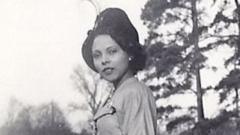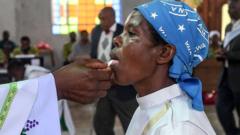**This article explores her struggles, achievements, and the renewed attention her story is receiving as her autobiography is re-released.**
### Rediscovering Andrée Blouin: The Overlooked Champion of African Independence

### Rediscovering Andrée Blouin: The Overlooked Champion of African Independence
**A look at the life and legacy of Andrée Blouin, a pivotal figure in Africa’s fight against colonialism.**
In an age where many are striving to unearth stories of historical significance, Andrée Blouin stands as a towering yet somewhat forgotten figure in the narrative of Africa's independence. Born in 1921 to a French father and a Central African mother, Blouin emerged in the heart of the independence movement during the 1950s and 60s, becoming an influential advocate for liberation, particularly in the Democratic Republic of Congo.
Her daughter, screenwriter Eve Blouin, reveals that her mother's fervent passion for decolonisation ignited following a profound personal tragedy: the death of her mixed-race son René due to medical neglect rooted in systemic racism. This pivotal event reframed Blouin's perception of colonialism, transforming her identity from a mere victim to a vocal opponent of the oppressive system that had affected her and her fellow Africans.
After her upbringing in a harsh orphanage for mixed-race children, Blouin's defiance became evident upon escaping forced marriage at just 15 years old. She eventually became actively involved in Guinea’s independence campaign, which unhinged her life from personal strife to political activism. Her journey saw her alongside esteemed leaders like Ghana's Kwame Nkrumah and Guinea’s Sékou Touré, where she worked to rally women towards the cause of independence, claiming space in a predominantly male political arena.
Her import grew notable; Blouin was soon appointed as chief of protocol and speechwriter for Patrice Lumumba, Congo’s first Prime Minister, who became a symbol of revolution. Though their partnership marked the zenith of her career, it was short-lived due to a plethora of crises leading to Lumumba’s tragic assassination, a loss that deeply affected her.
Forced into exile, Blouin held on to her commitment to the liberation cause, even as personal loss and political disillusionment entwined her later years. In a poignant reflection in her autobiography, "My Country, Africa: Autobiography of the Black Pasionaria," Blouin laments the continuing struggle for true freedom on the continent, attributing it to the failures of its leaders and internal divisions, alongside the challenges imposed by foreign powers.
The upcoming re-release of her memoir at Verso Books on January 7, seeks to rectify the historical oversight of her contributions. It aims to celebrate her resilience, courage, and ultimate sacrifice. While she passed away in 1986, Blouin's legacy persists, manifesting in cultural centers named in her honor, and among the movements seeking to amplify the roles of women in shaping Africa's destiny.
Andrée Blouin's life re-emerges in today's discourse, honored and remembered in a manner that grants her the recognition overdue for a pioneer of independence, whose story offers rich, multifaceted perspectives on Africa’s journey towards liberation.
Her daughter, screenwriter Eve Blouin, reveals that her mother's fervent passion for decolonisation ignited following a profound personal tragedy: the death of her mixed-race son René due to medical neglect rooted in systemic racism. This pivotal event reframed Blouin's perception of colonialism, transforming her identity from a mere victim to a vocal opponent of the oppressive system that had affected her and her fellow Africans.
After her upbringing in a harsh orphanage for mixed-race children, Blouin's defiance became evident upon escaping forced marriage at just 15 years old. She eventually became actively involved in Guinea’s independence campaign, which unhinged her life from personal strife to political activism. Her journey saw her alongside esteemed leaders like Ghana's Kwame Nkrumah and Guinea’s Sékou Touré, where she worked to rally women towards the cause of independence, claiming space in a predominantly male political arena.
Her import grew notable; Blouin was soon appointed as chief of protocol and speechwriter for Patrice Lumumba, Congo’s first Prime Minister, who became a symbol of revolution. Though their partnership marked the zenith of her career, it was short-lived due to a plethora of crises leading to Lumumba’s tragic assassination, a loss that deeply affected her.
Forced into exile, Blouin held on to her commitment to the liberation cause, even as personal loss and political disillusionment entwined her later years. In a poignant reflection in her autobiography, "My Country, Africa: Autobiography of the Black Pasionaria," Blouin laments the continuing struggle for true freedom on the continent, attributing it to the failures of its leaders and internal divisions, alongside the challenges imposed by foreign powers.
The upcoming re-release of her memoir at Verso Books on January 7, seeks to rectify the historical oversight of her contributions. It aims to celebrate her resilience, courage, and ultimate sacrifice. While she passed away in 1986, Blouin's legacy persists, manifesting in cultural centers named in her honor, and among the movements seeking to amplify the roles of women in shaping Africa's destiny.
Andrée Blouin's life re-emerges in today's discourse, honored and remembered in a manner that grants her the recognition overdue for a pioneer of independence, whose story offers rich, multifaceted perspectives on Africa’s journey towards liberation.


















